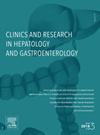BEND3通过激活PI3K/AKT/mTOR通路,诱导上皮-间质转化,促进肝癌的进展和转移。
IF 2.4
4区 医学
Q2 GASTROENTEROLOGY & HEPATOLOGY
Clinics and research in hepatology and gastroenterology
Pub Date : 2025-03-28
DOI:10.1016/j.clinre.2025.102582
引用次数: 0
摘要
目的:本研究旨在探讨BEND3在肝细胞癌(HCC)中的表达及其与临床特征的相关性,以及对HCC进展的功能和机制影响。方法:生物信息学分析发现BEND3在HCC中高表达,与临床预后不良相关,并通过qRT-PCR、western blotting和免疫组织化学进一步验证。构建稳定的bend3过表达和沉默细胞株,评价其功能作用。CCK-8和菌落形成试验评估了其对细胞增殖的影响,而伤口愈合和Transwell试验评估了其在迁移和侵袭中的作用。WB和免疫荧光分析BEND3对上皮-间质转化(epithelial-mesenchymal transition, EMT)和PI3K/AKT/mTOR信号通路的影响。结果:公共数据库分析、qRT-PCR、western blotting、免疫组化证实,与正常肝组织相比,HCC组织中BEND3的表达明显升高,且与预后不良密切相关。功能分析表明,BEND3促进HCC细胞增殖、迁移和侵袭。机制研究表明,BEND3通过诱导EMT和激活PI3K/AKT/mTOR信号通路来驱动HCC进展。结论:BEND3在HCC中高表达,与不良临床预后密切相关。功能和机制分析表明,BEND3通过EMT诱导和PI3K/AKT/mTOR通路激活促进增殖、迁移和侵袭,从而促进HCC进展。本文章由计算机程序翻译,如有差异,请以英文原文为准。
BEND3 promotes hepatocellular carcinoma progression and metastasis by activating the PI3K/AKT/mTOR pathway and inducing epithelial-mesenchymal transition
Objective
This study aimed to investigate the expression of BEND3 in hepatocellular carcinoma (HCC), its correlation with clinical characteristics, and its functional and mechanistic impacts on HCC progression.
Methods
Bioinformatics analyses identified BEND3 as highly expressed in HCC and associated with poor clinical prognosis, which was further validated using qRT-PCR, western blotting and immunohistochemistry. Stable BEND3-overexpressing and silenced cell lines were constructed to evaluate its functional effects. CCK-8 and colony formation assays assessed its influence on cell proliferation, while wound healing and Transwell assays evaluated its role in migration and invasion. WB and immunofluorescence were employed to analyze the effects of BEND3 on epithelial-mesenchymal transition (EMT) and the PI3K/AKT/mTOR signaling pathway.
Results
Public database analysis, alongside qRT-PCR, western blotting, and immunohistochemical, confirmed that BEND3 expression is significantly elevated in HCC tissues compared to normal liver tissues and is closely associated with poor prognosis. Functional assays demonstrated that BEND3 promotes HCC cell proliferation, migration, and invasion. Mechanistic studies revealed that BEND3 drives HCC progression by inducing EMT and activating the PI3K/AKT/mTOR signaling pathway.
Conclusion
BEND3 is highly expressed in HCC and strongly correlates with poor clinical outcomes. Functional and mechanistic analyses indicate that BEND3 enhances HCC progression by promoting proliferation, migration and invasion via EMT induction and PI3K/AKT/mTOR pathway activation.
求助全文
通过发布文献求助,成功后即可免费获取论文全文。
去求助
来源期刊

Clinics and research in hepatology and gastroenterology
GASTROENTEROLOGY & HEPATOLOGY-
CiteScore
4.30
自引率
3.70%
发文量
198
审稿时长
42 days
期刊介绍:
Clinics and Research in Hepatology and Gastroenterology publishes high-quality original research papers in the field of hepatology and gastroenterology. The editors put the accent on rapid communication of new research and clinical developments and so called "hot topic" issues. Following a clear Editorial line, besides original articles and case reports, each issue features editorials, commentaries and reviews. The journal encourages research and discussion between all those involved in the specialty on an international level. All articles are peer reviewed by international experts, the articles in press are online and indexed in the international databases (Current Contents, Pubmed, Scopus, Science Direct).
Clinics and Research in Hepatology and Gastroenterology is a subscription journal (with optional open access), which allows you to publish your research without any cost to you (unless you proactively chose the open access option). Your article will be available to all researchers around the globe whose institution has a subscription to the journal.
 求助内容:
求助内容: 应助结果提醒方式:
应助结果提醒方式:


